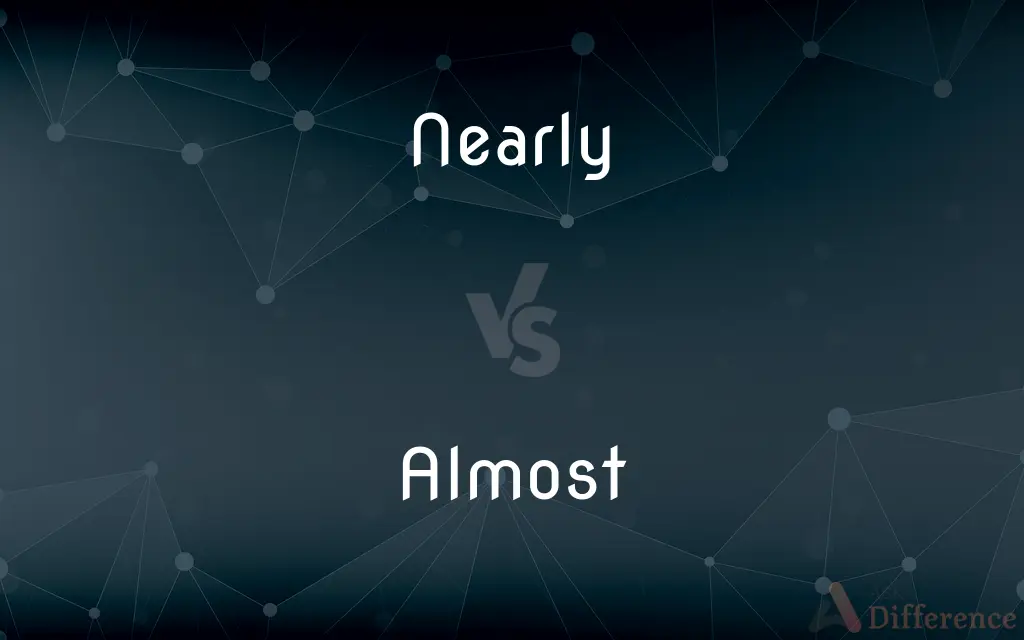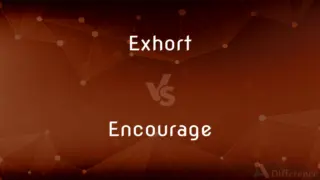Nearly vs. Almost — What's the Difference?
Edited by Tayyaba Rehman — By Urooj Arif — Updated on April 9, 2024
Nearly focuses on coming close to a specific point or degree, often implying a quantifiable proximity, while almost suggests a broader sense of being close to or nearly achieving something, without always being quantifiable.

Difference Between Nearly and Almost
Table of Contents
ADVERTISEMENT
Key Differences
Nearly often refers to something that is close to a specific point, number, or degree, emphasizing precision and a quantifiable measure. For example, when we say, "The glass is nearly full," we imply that it is close to being completely full, with a clear and measurable gap. Almost, on the other hand, conveys a sense of being very close to a state or condition, but it doesn't always imply a measurable amount. "The glass is almost full" suggests that the glass is close to fullness, but with a possibly undefined or less precise gap.
When discussing time, "nearly" is used to indicate that a specific time is close at hand, with an implication of precision. Saying, "It's nearly 3 PM" suggests that it is just short of 3 PM, perhaps a few minutes away. Conversely, "almost" implies a broader approximation of time, without the need for exactness. "It's almost 3 PM" can mean the same as "nearly 3 PM" but feels less precise and could imply a slightly broader time range.
In the context of achievements or goals, "nearly" implies that one is very close to completion or achievement, with an understood measure of what is left to accomplish. For instance, saying, "She has nearly finished the project" implies that very little work remains. "Almost" in a similar context suggests being close to an achievement but with an emphasis on the small but undefined amount of effort or time remaining. "She has almost finished the project" conveys a sense of imminent completion without focusing on the specifics.
When used to describe frequency, "nearly" implies a high frequency that is close to the maximum or expected frequency, such as in, "He goes to the gym nearly every day." This suggests a quantifiable frequency that is just short of the total. "Almost," when used similarly, as in, "He goes to the gym almost every day," also suggests high frequency but with a slightly more flexible interpretation of what constitutes near-maximum frequency.
In expressing proportions or extents, "nearly" suggests a quantifiable measure that is just short of being complete or whole, like "Nearly half of the attendees voted." This implies a specific, measurable proportion. "Almost" used in a similar vein, such as "Almost half of the attendees voted," suggests a close to half proportion but with a less precise, more approximate sense.
ADVERTISEMENT
Comparison Chart
Quantifiability
Implies a precise, quantifiable measure
Suggests a close proximity without exactness
Time
Used with a sense of precision in time
Conveys a broader approximation of time
Achievements
Indicates a specific, measurable closeness to completion
Implies closeness to completion with less focus on specifics
Frequency
Implies a high frequency nearly at the maximum
Suggests a high frequency with more flexibility
Proportions/Extents
Suggests a specific, measurable proportion close to a whole
Implies a close proportion with less precision
Compare with Definitions
Nearly
Close to being the case but not exactly or entirely.
She's nearly as tall as I am.
Almost
Nearly but not exactly or entirely.
That's almost correct.
Nearly
Indicating something happens almost but not quite every time.
He wins nearly every game he plays.
Almost
Used to indicate that something is close to happening or being the case.
She's almost finished with her degree.
Nearly
Very close to in quantity or degree.
The auditorium was nearly empty.
Almost
Suggesting a small margin from a certain state.
We're almost out of time.
Nearly
Used to suggest that something is almost but not completely the case.
We're nearly done with the project.
Almost
Not quite; very nearly.
The theater was almost full.
Nearly
Just short of a specific point or time.
It's nearly midnight.
Almost
Used to express a slight or uncertain difference.
He's almost too good for this league.
Nearly
Almost but not quite
The coat nearly fits.
Almost
In set theory, when dealing with sets of infinite size, the term almost or nearly is used to refer to all but a negligible amount of elements in the set. The notion of "negligible" depends in the context, and may mean "of measure zero" (in a measure space), "countable" (when uncountably infinite sets are involved), or "finite" (when infinite sets are involved).For example: The set S = { n ∈ N | n ≥ k } {\displaystyle S=\{n\in \mathbb {N} \,|\,n\geq k\}} is almost N {\displaystyle \mathbb {N} } for any k {\displaystyle k} in N {\displaystyle \mathbb {N} } , because only finitely many natural numbers are less than k {\displaystyle k} .
Nearly
In a close manner; intimately
A matter nearly affecting our interests.
Almost
Not quite; very nearly
He almost knocked Georgina over
The place was almost empty
Blues, jazz—he can play almost anything
Nearly
In close approximation; almost, virtually.
He left a nearly full beer on the bar.
I nearly didn't go to work yesterday.
He was (so/very) nearly caught.
Almost
Slightly short of; not quite; nearly
Almost time to go.
Was almost asleep.
Had almost finished. See Usage Note at none.
Nearly
With great scrutiny; carefully.
Almost
Very close to, but not quite.
Nearly
With close relation; intimately.
Almost
(mathematics) Up to, except for a negligible set where negligible is not universally but contextually defined.
Almost all
Almost no
Nearly
Closely, in close proximity.
Almost
A null set; except for a set of measure 0.
Almost everywhere
Almost nowhere
Almost certain
Almost sure
Nearly
Stingily.
Almost
(informal) Something or someone that doesn't quite make it.
In all the submissions, they found four papers that were clearly worth publishing and another dozen almosts.
Nearly
In a near manner; not remotely; closely; intimately; almost; as, he nearly lost his life in the accident.
Almost
Nearly; well nigh; all but; for the greatest part.
Almost thou persuadest me to be a Christian.
Nearly
(of actions or states) slightly short of or not quite accomplished; `near' is sometimes used informally for `nearly' and `most' is sometimes used informally for `almost';
The job is (just) about done
The baby was almost asleep when the alarm sounded
We're almost finished
The car all but ran her down
He nearly fainted
Talked for nigh onto 2 hours
The recording is well-nigh perfect
Virtually all the parties signed the contract
I was near exhausted by the run
Most everyone agrees
Almost
(of actions or states) slightly short of or not quite accomplished; `near' is sometimes used informally for `nearly' and `most' is sometimes used informally for `almost';
The job is (just) about done
The baby was almost asleep when the alarm sounded
We're almost finished
The car all but ran her down
He nearly fainted
Talked for nigh onto 2 hours
The recording is well-nigh perfect
Virtually all the parties signed the contract
I was near exhausted by the run
Most everyone agrees
Nearly
In a close manner;
The two phenomena are intimately connected
The person most nearly concerned
Common Curiosities
Can "almost" imply a sense of failure to achieve something?
Yes, "almost" can imply that something was close to happening but did not, often highlighting a missed opportunity or failure.
Is "nearly" more precise than "almost"?
Yes, "nearly" often implies a more precise measurement than "almost."
Are there contexts where "nearly" cannot replace "almost"?
Yes, in expressions of approximation without a need for precision, "almost" is more fitting.
Does "nearly" imply a closer proximity than "almost"?
Not necessarily; both suggest closeness, but "nearly" is often used in more quantifiable contexts.
Is "almost" more common in casual speech?
"Almost" is widely used in both casual and formal speech, but its flexibility makes it slightly more common in casual contexts.
Do "nearly" and "almost" have the same emotional impact?
The emotional impact can vary; "nearly" might feel more factual, while "almost" can convey a sense of missed potential.
Can "nearly" and "almost" be used interchangeably?
They are often interchangeable, but "nearly" may convey a sense of greater precision.
Can "almost" suggest a greater degree of uncertainty than "nearly"?
Yes, "almost" can convey a sense of uncertainty or flexibility more so than "nearly."
Does "almost" work better in hyperbolic expressions?
"Almost" is often used in hyperbolic statements due to its less precise nature.
Is "nearly" used more with numbers and time?
Yes, "nearly" is commonly used when discussing numbers and specific points in time due to its precision.
Why might an author choose "nearly" over "almost"?
An author might choose "nearly" for precision or to convey a sense of being very close to a quantifiable measure.
Is "nearly" more formal than "almost"?
"Nearly" can sound slightly more formal due to its precision, but both are used in formal and casual contexts.
How does the use of "nearly" or "almost" affect sentence meaning?
The choice can subtly change the meaning, with "nearly" often adding precision and "almost" implying a broader approximation.
Can "almost" be used in a positive sense?
Yes, "almost" can be used positively, especially when highlighting progress or near-success.
Share Your Discovery

Previous Comparison
Exhort vs. Encourage
Next Comparison
Road vs. HighwayAuthor Spotlight
Written by
Urooj ArifUrooj is a skilled content writer at Ask Difference, known for her exceptional ability to simplify complex topics into engaging and informative content. With a passion for research and a flair for clear, concise writing, she consistently delivers articles that resonate with our diverse audience.
Edited by
Tayyaba RehmanTayyaba Rehman is a distinguished writer, currently serving as a primary contributor to askdifference.com. As a researcher in semantics and etymology, Tayyaba's passion for the complexity of languages and their distinctions has found a perfect home on the platform. Tayyaba delves into the intricacies of language, distinguishing between commonly confused words and phrases, thereby providing clarity for readers worldwide.














































